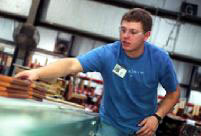WEST VIRGINIA SPOTLIGHT
Small Is Still Beautiful
While capable of accommodating
mega-projects, West Virginia's jagged terrain and unique sociology lend
themselves to smaller industrial operations, Gov. Bob Wise says.
"If somebody says they want 2,000 acres [809 hectares], we can get it for them," he tells Site Selection. "But the culture of West Virginia is really ideal for small and mid-sized
companies."
Recent changes in the state's incentives and workers' compensation program are also bringing new companies to the state, says Wise. "We completely re-wrote our tax incentives two years ago so that there is greater reward for job creation." But new programs also extend assistance to projects that are not labor-intensive. "We went from having no R&D tax credit to having one of the most sweeping in the country," Wise says. The legislature directed over $24 million to seven venture capital funds with interests in the state and authorized $225 million in economic development grants to encourage communities to respond aggressively to new business opportunities, especially those in biosciences.
After balking at a proposal for a discretionary incentive fund a year earlier, state legislators in 2002 committed $1.5 million for a "Sunny Day Fund." The move came just in time to assist American Woodmark Corporation with its third expansion in Hardy County. In November 2003, publicly traded American Woodmark, which builds kitchen cabinetry, announced plans to construct a 250,000-sq.-ft. (23,225-sq.-m.) site on 40 acres (16 hectares) at the Robert C. Byrd Industrial Park. The company's $27-million project is being sweetened by $400,000 in support from the Sunny Day Fund. "It gives me some flexibility," Wise says of the fund, proceeds of which can be used for site development, equipment leasing and other project purposes.
A major overhaul of West Virginia's ailing workers' comp system has also ignited interest from business. "American Woodmark initially expressed concern about our workers' compensation," Wise recalls. In addition to streamlining the administration of the system under its own free-standing board, the state stiffened eligibility and froze base rates for two years.
Wise, a Democrat and former nine-term congressman, was also instrumental in overcoming organized labor's long-held objections to tax increment financing (TIF). In November 2002, West Virginia voters narrowly approved a TIF referendum, opening the door to a plethora of commercial and industrial projects. The largest of them: Cabela's, the fast-growing retailer of outdoor gear. In 2003, the Nebraska-based company broke ground on a mammoth distribution center, retail complex and wildlife museum spread across 110 acres [45 hectares] near Wheeling. The distribution site alone — the company's first in the eastern U.S. — covers 400,000 sq. ft. (37,160 sq. m.). But the facility can expand to as much as one million sq. ft. (92,900 sq. m.) as company needs evolve. It will take about 750 employees to man the center and the adjacent 175,000-sq.-ft. (16,258-sq.-m.) retail space. "We couldn't have done the Cabela's deal three years ago," Wise says. "We would not have had the tools."
"If somebody says they want 2,000 acres [809 hectares], we can get it for them," he tells Site Selection. "But the culture of West Virginia is really ideal for small and mid-sized
 |
| "Sunny Day Funds" were one tool helping cabinet maker American Woodmark Corp. make the decision to expand for the third time in Hardy County, with a US$27-million investment. |
Recent changes in the state's incentives and workers' compensation program are also bringing new companies to the state, says Wise. "We completely re-wrote our tax incentives two years ago so that there is greater reward for job creation." But new programs also extend assistance to projects that are not labor-intensive. "We went from having no R&D tax credit to having one of the most sweeping in the country," Wise says. The legislature directed over $24 million to seven venture capital funds with interests in the state and authorized $225 million in economic development grants to encourage communities to respond aggressively to new business opportunities, especially those in biosciences.
After balking at a proposal for a discretionary incentive fund a year earlier, state legislators in 2002 committed $1.5 million for a "Sunny Day Fund." The move came just in time to assist American Woodmark Corporation with its third expansion in Hardy County. In November 2003, publicly traded American Woodmark, which builds kitchen cabinetry, announced plans to construct a 250,000-sq.-ft. (23,225-sq.-m.) site on 40 acres (16 hectares) at the Robert C. Byrd Industrial Park. The company's $27-million project is being sweetened by $400,000 in support from the Sunny Day Fund. "It gives me some flexibility," Wise says of the fund, proceeds of which can be used for site development, equipment leasing and other project purposes.
A major overhaul of West Virginia's ailing workers' comp system has also ignited interest from business. "American Woodmark initially expressed concern about our workers' compensation," Wise recalls. In addition to streamlining the administration of the system under its own free-standing board, the state stiffened eligibility and froze base rates for two years.
Wise, a Democrat and former nine-term congressman, was also instrumental in overcoming organized labor's long-held objections to tax increment financing (TIF). In November 2002, West Virginia voters narrowly approved a TIF referendum, opening the door to a plethora of commercial and industrial projects. The largest of them: Cabela's, the fast-growing retailer of outdoor gear. In 2003, the Nebraska-based company broke ground on a mammoth distribution center, retail complex and wildlife museum spread across 110 acres [45 hectares] near Wheeling. The distribution site alone — the company's first in the eastern U.S. — covers 400,000 sq. ft. (37,160 sq. m.). But the facility can expand to as much as one million sq. ft. (92,900 sq. m.) as company needs evolve. It will take about 750 employees to man the center and the adjacent 175,000-sq.-ft. (16,258-sq.-m.) retail space. "We couldn't have done the Cabela's deal three years ago," Wise says. "We would not have had the tools."

